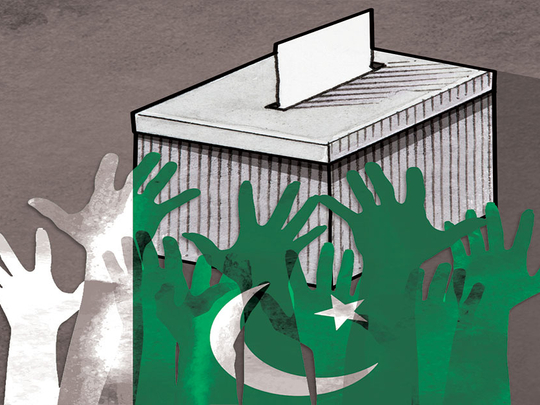
When Pakistan goes to the polls on Wednesday to elect members of a new parliament and provincial legislatures, many voters will be left asking themselves a compelling question: Whether their lives will change for the better in the years to come?
That fundamental question has tragically remained unaddressed in the run-up to this week’s parliamentary elections preceded by months of sharp divisions between the main contenders.
On the one hand, former prime minister Nawaz Sharif, who was disqualified in 2017 by a Supreme Court verdict following a trial on corruption, has repeatedly cried fowl. Sharif, who is the de factor leader of the Pakistan Muslim League-Nawaz (PML-N) party and remains in jail after recently being sentenced to ten years in prison by an anti-corruption court, claims he was targeted in a conspiracy meant to undermine Pakistan’s democratic framework.
In a visibly desperate bid to reclaim lost ground, Sharif and his daughter Mariam — who was sentenced to seven years in prison — returned home from London on July 13 to offer to be arrested. For them, this seemingly ill-advised choice may well have been meant to gain last-minute sympathy, especially from undecided voters.
On the other hand, Imran Khan, the former cricket star-turned politician and his Pakistan Tehreek-e-Insaf (PTI) party has run a single-agenda campaign, seeking to curb corruption in the highest corridors of power. Many Pakistanis can relate to Imran’s message given that they face the ugly reality of graft in their daily lives across Pakistan.
Somewhere between these two extremes stands Pakistan Peoples Party (PPP), once ably led by Zulfiqar Ali Bhutto and more recently by his daughter Benazir Bhutto before her 2007 assassination, when the mantle fell on Benazir’s husband Asif Ali Zardari and son Bilawal. Barring a surprise, the PPP appears to have become confined to the third place in Pakistani politics and that too within its main home base, the southern Sindh province. It’s a profile that is a sharp step-down from the party’s golden days when the PPP used to be a mainstream national political party, armed with the ability to unite a wide range of diverse ideological, ethnic and political leanings. In case neither of the two frontline parties — the PML-N or the PTI — successfully win a majority, the PPP will shoot to prominence as a possible coalition partner in a future ruling structure.
But even if one of these political entities forms the next government, there are few assurances yet of a transformation of the lives of ordinary Pakistanis. Over time, the Pakistani public has found itself neglected on key matters such as education, health care and jobs — especially in lower-income neighbourhoods.
In the past few years, while much has been said in official circles about the progress or the lack of it in the mainstream, the glaring gap between demand and supply exists and points towards myriads of challenges. Across Pakistan, with its population of more than 210 million, a large number of people remain excluded from the political process. While some may head to vote on Wednesday, their choice of a candidate will primarily be restricted to the parameters of overcoming local challenges.
Given such a scenario, Pakistan can hardly expect to reform itself for the better, especially since many bitter rivals are squarely locked in what appear to be battles to win the largest possible share of Pakistan’s political turf. For many voters, the decision to vote for a candidate has tragically become more of a matter of habit than a well-thought out, conscious decision.
There are two other vital issues concerning Wednesday’s elections. First, many countries around the world that pride themselves as stable democracies have improved the quality of their governments by consistently holding elections on time. Such regularity has forced individual political players and parties over time to become more attuned to the public’s expectations from their rulers. Second, any democracy that continues to function without a full commitment to transparency and public disclosures on a range of matters can simply not claim to live up to globally accepted standards of civilian rule.
With Pakistan’s rival political players locked in a visibly intense battle against each other, its unlikely that the country’s political temperature will cool down even after the elections. However, a concerted push towards a broad-based agreement between political parties to improve transparency in governance will indeed make a major contribution towards improving Pakistan’s quality of democracy. One important outcome of this exercise will in fact be a likely rise in the public’s appreciation of the ruling structure, as an increasing number of Pakistanis get exposed to previously unavailable micro details of public expenditure.
Given that the run-up to Wednesday’s elections has been marred by acrimony between some of Pakistan’s key political rivals, its vital that the post-election environment witnesses some badly-needed cooling off period. And yet, Pakistanis must also use the occasion for celebrating an important achievement, once considered to be a pipe dream: The very fact that the 2018 parliamentary elections mark the third smooth transition to a new civilian government in Pakistan since 2008 is no small achievement. Pakistan can indeed pride itself as coming of age, beyond the era of military rule, which dominated the country years ago.
Farhan Bokhari is a Pakistan-based commentator who writes on political and economic matters.










